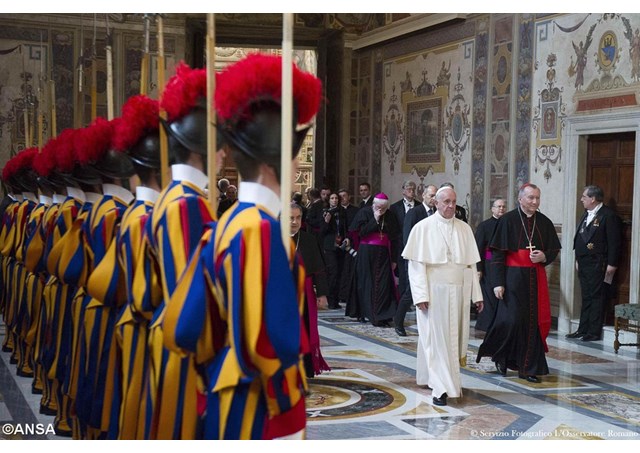
Pope's long term perspective on migration gives him global voice

(Vatican Radio) Analysts continue to look closely at Pope Francis’ speech to the Holy See’s diplomatic corps earlier this week, exploring in particular the impact he hopes the Church’s Jubilee Year of Mercy can have on political crises in countries around the world.
In his speech on Monday to ambassadors of the 180 countries with diplomatic ties to the Vatican, the Pope chose to speak especially of what he called “the grave crisis of migration” facing Europe as well as parts of Asia and the Americas.
Historian and theology professor Massimo Faggioli teaches at the University of St Thomas in St Paul, Minnesota. He talked to Philippa Hitchen about the challenges the Pope raised in his address, especially to European politicians and diplomats
Professor Faggioli notes that while Pope Francis’ address is aimed at the whole diplomatic corps, his words are especially focused on the European Union which is facing the biggest wave of migrants and refugees since World War II. After that war, he notes, the waves of refugees, especially from Eastern Europe were part of a larger diplomatic plan, since it was clear what deal had been struck between the allies and the USSR at Yalta and Potsdam. Right now, he says, there is no plan and the refugees are from different ethnic, political and religious backgrounds, so it’s much for difficult for European politicians to understand what is “the end game”….
Faggioli notes that the current wave of migration coincides with a deep crisis within European identity. He points to the threats to democracy in Poland or the problems in countries like Ukraine and Turkey which border the European Union and says the paradox is that of a Catholic Pope from Argentina who appears to be “one of the last leaders who believes in the European Union”…
Asked about potential allies within the EU who share his perspective, Faggioli says until a few days ago, prior to the revelations of attacks on women in Cologne, Angela Merkel was also outspoken on the necessity of German to welcome migrants and refugees – a view she defended on the basis of her Christian background. Now that is much more difficult, Faggioli says, adding that “leadership in Europe right now is weak and shortsighted so the Pope doesn’t have many partners in this dialogue”
Another paradox that Professor Faggioli point to is the fact that right wing parties in Germany, France or the UK do not support the Pope’s social policies, while some left wing politicians can be embarrassed to make explicit connections to the social message of the Catholic Church. He notes that a similar paradox exists in the United States, where it is not the Catholic politicians or presidential candidates who are defending the Pope’s policies but rather the non-Catholic politicians.
Commenting on the Pope’s appeal for dialogue and engagement, especially with the Muslim world, Faggioli says the Pope frames this appeal, “not just in purely pragmatic terms but also at an intellectual and spiritual level”. Over the half century since Vatican II, he says, theologians have seen the deep connections between the theology of other religions and the global dimensions of the Catholic Church, thus they understand the dynamics of dialogue and identity which are not always clear to secular politicians. Usually the secular leaders are looking for short term results, he adds, while the Catholic Church takes a different view and thus the Pope is one of the few leaders with a truly global voice.
| All the contents on this site are copyrighted ©. |


